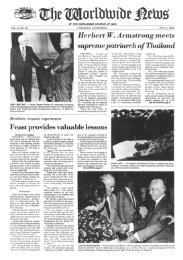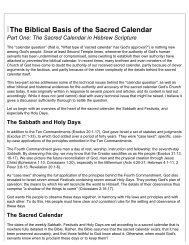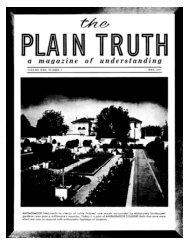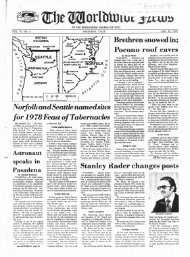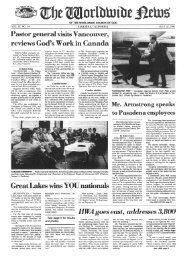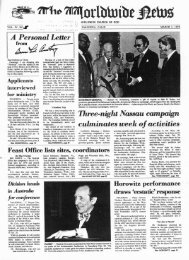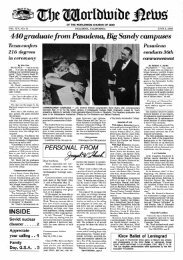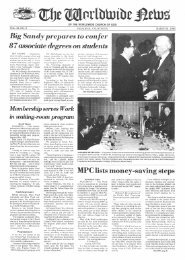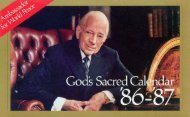PT Sep-78 - Herbert W. Armstrong Library and Archives
PT Sep-78 - Herbert W. Armstrong Library and Archives
PT Sep-78 - Herbert W. Armstrong Library and Archives
Create successful ePaper yourself
Turn your PDF publications into a flip-book with our unique Google optimized e-Paper software.
THE SABBATH AND<br />
THE TEN COMMANDMENTS<br />
Is the Sabbath comm<strong>and</strong>ment still a part of the Decalogue? Or is it the only one of the Ten<br />
Comm<strong>and</strong>ments that is now obsolete?<br />
Nowhere in the New Testament<br />
are the Ten Comm<strong>and</strong>ments<br />
listed in order from one to ten.<br />
Nowhere in the New Testament is the<br />
Sabbath comm<strong>and</strong> repeated verbatim.<br />
Without the Old Testament we<br />
would not know the exact construction<br />
of God's basic law. Without the<br />
Old Testament we would not even<br />
know that the exact number of comm<strong>and</strong>s<br />
is ten. These are startling facts<br />
that many of us have never stopped to<br />
consider.<br />
What about it? Is there any logical<br />
biblical reason why we should<br />
keep the Sabbath today? Should we<br />
now keep all ten of the Ten Comm<strong>and</strong>ments-<br />
or only those points<br />
that pertain to our neighbor?<br />
Should we love God only in a very<br />
general manner?<br />
Old Testament Background<br />
By way of a brief background, the<br />
first Sabbath day followed the six<br />
working days of creation (Gen. 2: 1-<br />
3). A comm<strong>and</strong> to remember this<br />
first Sabbath day was later inculcated<br />
into ancient Israel's basic<br />
constitutional law listed in Exodus<br />
20 <strong>and</strong> Deuteronomy 5 (see accompanying<br />
box on next page). These<br />
fundamental decrees were the only<br />
ones spoken <strong>and</strong> written by the Creator<br />
Himself. All other codified<br />
laws, statutes, judgments <strong>and</strong> ordinances<br />
were relayed to Moses<br />
through angelic mediation.<br />
Moses later summarized God's<br />
personal role as Lawgiver in the<br />
book of Deuteronomy: "At that<br />
time the Lord said to me, 'Hew two<br />
tables of stone like the first, <strong>and</strong><br />
come up to me on the mountain,<br />
<strong>and</strong> make an ark of wood. And I<br />
will write on the tables the words that<br />
were on the first tables which you<br />
by John R. Schroeder<br />
broke, <strong>and</strong> you shall put them in the<br />
ark.' So I made an ark of acacia wood,<br />
<strong>and</strong> hewed two tables of stone like the<br />
first, <strong>and</strong> went up the mountain with<br />
the two tables in my h<strong>and</strong>. And he<br />
[God] wrote on the tables, as at the<br />
first writing, the ten comm<strong>and</strong>ments<br />
which the Lord had spoken to you on<br />
the mountain out of the midst of the<br />
fire on the day of the assembly; <strong>and</strong><br />
the Lord gave them to me" (Deut.<br />
10: 1-4, RSV).<br />
Another summary account is also<br />
well worth quoting. It shows the vital<br />
significance that God attributes to<br />
His basic moral law: " . .. The Lord<br />
said to me, 'Gather the people to me,<br />
that I may let them hear my words<br />
[personally <strong>and</strong> directly- not through<br />
either Moses or angelic mediation], so<br />
that they may learn to fear me all the<br />
days that they live upon the earth, <strong>and</strong><br />
that they may teach their children so.'<br />
And you came near <strong>and</strong> stood at the<br />
foot of the mountain . . . . Then the<br />
Lord spoke to you . ... And he declared<br />
to you his covenant, which he<br />
comm<strong>and</strong>ed y ou to perform, that is,<br />
the ten comm<strong>and</strong>ments ... " (Deut.<br />
4: 10-13).<br />
New Testament Application<br />
James, leading apostle of the Jerusalem<br />
Church of God, referred to the<br />
whole Decalogue in his general<br />
epistle to the twelve tribes of Israel.<br />
He wrote: "If you really fulfi l the<br />
royal law, according to the scripture,<br />
'You shall love your neighbor as<br />
yourself,' you do well. But if you<br />
show partiality, you commit sin, <strong>and</strong><br />
are convicted by the law as transgressors<br />
[sin is the transgression of<br />
the law; see I John 3:4]. For whoever<br />
keeps the whole law but fails in<br />
one point has become guilty of all of<br />
it. For he [remember this is God]<br />
who said, 'Do not commit adultery,'<br />
said also, 'Do not kill.' If you do not<br />
commit adult.ery but do kill, you<br />
have become a transgressor of the<br />
law. So speak <strong>and</strong> so act as those<br />
who are to be judged under the law<br />
of liberty" (James 2:8-1 2).<br />
J ames, here, establishes several<br />
significant facts :<br />
I) The royal law is summarized<br />
by the Old Testament comm<strong>and</strong> to<br />
love your neighbor as yourself (see<br />
Lev. 19 : 18).<br />
2) The royal law has distinct<br />
points.<br />
3) Two of those points include<br />
the sixth <strong>and</strong> seventh comm<strong>and</strong>ments<br />
as listed in the Decalogue.<br />
4) Transgression of any of these<br />
points is sin.<br />
5) Failure to keep one point is<br />
considered, spiritually, as breaking<br />
them all.<br />
6) This royal law is also termed<br />
the "law of liberty."<br />
7) Christians are to be judged by<br />
this royal law of liberty.<br />
A few questions should be asked<br />
at this juncture. Do the points James<br />
mentions exclude the first four comm<strong>and</strong>ments<br />
defining man's relationship<br />
with his God? Or do they refer<br />
to all ten as duly delineated in Exodus<br />
20 <strong>and</strong> Deuteronomy 5? Are<br />
Christians only required to specifically<br />
keep the last six comm<strong>and</strong>ments<br />
defining man's proper<br />
association with his neighbor, while<br />
observing the first four only in some<br />
sort of an ethereal sense?<br />
Let us withhold judgment until<br />
we have examined a few more of<br />
the New Testament documents.<br />
Jesus <strong>and</strong> the Ten Comm<strong>and</strong>ments<br />
A rich young ruler once came to<br />
Jesus <strong>and</strong> asked Him a vitally im-<br />
20<br />
The PLAIN TRUTH <strong>Sep</strong>tember 19<strong>78</strong>.



